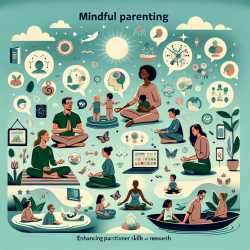Introduction
In the ever-evolving landscape of child development and therapy, practitioners are continually seeking effective strategies to enhance their skills and outcomes for children. One promising approach is mindful parenting, a concept explored in depth in the research article "Mindful Parenting: Perspectives on the Heart of the Matter" by Kabat-Zinn and Kabat-Zinn. This blog delves into the findings of this research and offers insights into how practitioners can implement these outcomes to improve their practice.
Understanding Mindful Parenting
Mindful parenting is not merely a method to create "better" children or to become "better" parents. Instead, it emphasizes embracing the parenting journey with moment-to-moment awareness, love, and discovery. The research highlights that mindful parenting is about nurturing the entire family dynamic, allowing both parents and children to grow and flourish within the family unit.
Key Outcomes of the Research
The research identifies several key outcomes that can be beneficial for practitioners:
- Stress Reduction: Mindfulness practices have been shown to reduce stress in parents, which can, in turn, positively impact children. Practitioners can encourage parents to adopt mindfulness techniques to manage stress effectively.
- Enhanced Awareness: Mindful parenting involves being aware of a child's unique nature, feelings, and needs. Practitioners can guide parents to develop this awareness, fostering a more supportive environment for the child.
- Improved Communication: The practice encourages listening with full attention, which can enhance communication between parents and children. Practitioners can model and teach these communication skills to parents.
- Emotional Regulation: By recognizing and accepting emotions as they arise, parents can learn to respond rather than react. This skill is crucial for maintaining a calm and nurturing environment.
Implementing Mindful Parenting in Practice
For practitioners, integrating mindful parenting into their work involves both personal and professional growth. Here are some strategies to consider:
- Personal Practice: Practitioners should cultivate their own mindfulness practice. This personal experience can enhance their ability to teach and model mindfulness to parents and children.
- Education and Training: Providing workshops or training sessions on mindful parenting can equip parents with the tools they need to practice mindfulness effectively.
- Collaboration: Working collaboratively with parents to set realistic goals for mindfulness practice can lead to more sustainable outcomes.
- Resource Sharing: Offering resources such as books, apps, or online courses can support parents in their mindfulness journey.
Encouraging Further Research
While the current research provides valuable insights, there is always room for further exploration. Practitioners are encouraged to stay informed about the latest developments in mindfulness and parenting research. Engaging in ongoing professional development can help practitioners refine their skills and offer the best possible support to families.
Conclusion
Mindful parenting offers a powerful framework for enhancing the well-being of both parents and children. By integrating mindfulness practices into their work, practitioners can create more positive outcomes for families. As we continue to explore the potential of mindful parenting, it is essential to remain open to new research and insights.
To read the original research paper, please follow this link: Mindful Parenting: Perspectives on the Heart of the Matter.










